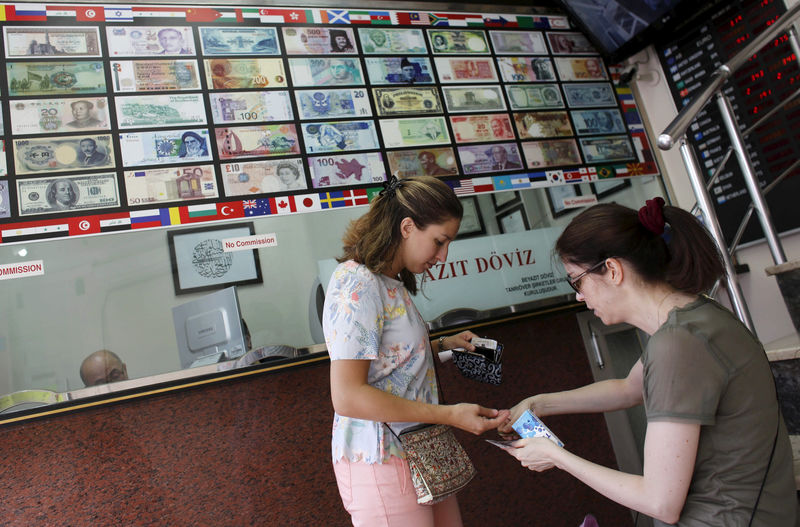By Nevzat Devranoglu and Tuvan Gumrukcu
ANKARA (Reuters) - Concerns about President Tayyip Erdogan's grip on monetary policy and worsening relations with the United States have sent Turkey's lira
It has lost more than a quarter of its value against the dollar this year, with the sell-off deepening even after the central bank hiked rates at an emergency meeting in May. The crisis has raised concerns about the impact on banks, corporate debt and the broader economy.
Here are some scenarios on how the central bank could react.
1/TALK IT UP
One of the easiest, and ultimately least effective, options. Central Bank Governor Murat Cetinkaya or Finance Minister Berat Albayrak could attempt to calm the markets via public commentary.
While the tactic is often used by policymakers in times of turmoil, economists said any attempt to talk up the lira would give it a short-term boost at best.
"This is going to require more than verbal intervention," said William Jackson of Capital Economics.
2/KEEP QUIET AND CARRY ON
Policymakers could try and hang on until the central bank's next monetary policy meeting on Sept. 13. But if the last few days are anything to go by, that would mean a lot more pain for the lira, and further erosion of the bank's credibility in the eyes of investors.
Tellingly, both Erdogan and Albayrak, his son-in-law, have remained quiet in recent days. That is in sharp contrast to Erdogan's usual defiant stance in the face of lira sell-offs.
The president, who has described interest rates as the "mother and father of all evil", has previously cast lira selling as an attempt by the West to bring Turkey to its knees -- rhetoric that has not helped mollify investors.
3/LOOSEN UP
All banks are required to hold a portion of their lira and foreign currency deposits as reserves. The central bank can loosen those requirements, thereby freeing up foreign exchange liquidity. This could reduce lira volatility by ensuring there is enough, or excess, liquidity in the market.
The bank tried this during May's sell-off, providing some $10 billion worth of liquidity, although it was ultimately forced to hike interest rates by a dramatic 300 basis points anyway.
It tried the same tactic on Monday, freeing up some $2.2 billion. The move seems to have backfired, with economists saying it strengthened the perception that the central bank lacks independence.
"The lira plunged as markets got the impression that the central bank has problems hiking rates," well-known Turkish economist Mahfi Egilmez said on Twitter. "It would have been better if they did not change the reserve requirements at all."
Like verbal intervention, this tactic would generally be deployed in the run-up to a rate hike.
4/HEFTY HIKE, STRONG MESSAGE
This is the best-case scenario for investors, and would go a long way to putting a floor under the battered lira. The central bank would deliver a substantial rate hike, along with a message that it was independent and able to keep rates high for an extended period to tackle inflation.
Investors are probably looking for a real interest rate of 5-10 percent, Capital Economics' Jackson said, meaning that with inflation now at nearly 16 percent they would need to see interest rates of more than 20 percent. The benchmark repo rate
But the size of the hike would be "less important than what accompanies it," he said, adding "you want to see that interest rates are going to remain high for a very long time".
The central bank has stated it will maintain a tight monetary policy stance "for a long time", and not hesitate to deliver additional tightening if required.
In its latest inflation report it signaled that the impact of the lira's depreciation on inflation could necessitate a tighter monetary policy stance "for longer".
5/IT'S COMPLICATED (AGAIN)
The bank could return to its complex system of using multiple rates to set policy, keeping the benchmark steady while funding again through its late liquidity window, at a higher rate. This is seen as an unlikely option, as it would roll back the recently completed return to a single rate. It might provide a brief reprieve but would undermine market confidence in the longer term.
6/SELLING DOLLARS
This is the least likely option given the central bank's low forex reserves -- it has around $21 billion it could use to buy lira. Including all reserve requirements and government accounts, it has $100 billion.
The central bank has said that direct intervention is no longer a valid policy option in global central banking. Like other central banks in emerging markets, it prefers to use swaps or non-deliverable forward-like forex liquidity measures that don't directly decrease its net reserves.
7/CAPITAL CONTROLS
Both politicians and the central bank have clearly said such an option is not on the table. Capital controls would undermine investor confidence in Turkey, once seen as a star emerging market.
